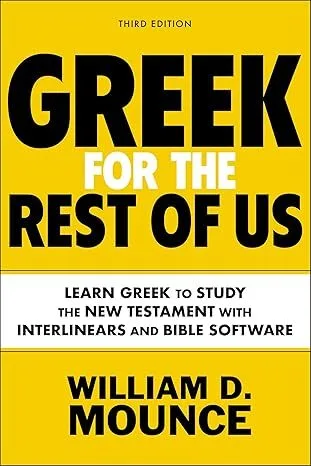Pronunciation Guide: oo-DICE
Quick Answer: οὐδείς is the strongest form of negation in biblical Greek, meaning “no one,” “nothing,” or “none whatsoever.” This absolute negative emphasizes complete exclusion and reveals the totality of God’s sovereignty—when Scripture says “no one” can do something apart from יהוה, it means absolutely no one, without exception.

Key Information
οὐδείς

Strong’s Entry
g3762
oudeis (ou-deis’) (including feminine oudemia oo-dem-ee’-ah, and neuter ouden oo-den’) adj.1. not even one (man, woman or thing), i.e. none, nobody, nothing[from G3761 and G1520]KJV: any (man), aught, man, neither any (thing), never (man), no (man), none (+ of these things), not (any, at all, -thing), nought Root(s): G3761, G1520
What Does οὐδείς Mean?
Strong’s G3762: οὐδείς represents the most emphatic and absolute form of negation in the Greek New Testament, conveying complete and total exclusion without any exceptions. Unlike softer negatives, this word establishes an unbreachable boundary—when the Messiah declares “no one comes to the Father except through me” (John 14:6), οὐδείς eliminates every possible alternative path. This powerful negative appears 234 times in the New Testament, often emphasizing divine sovereignty, human limitation, and the exclusive nature of salvation through Yeshua. The word’s absolute character makes it particularly significant in theological contexts, where it underscores the complete dependence of humanity upon God’s grace and the impossibility of achieving righteousness through human effort alone.
Key Insight: οὐδείς doesn’t simply mean “not one”—it means “absolutely not even one,” emphasizing totality and divine authority.
Where Does οὐδείς Come From?
- Part of Speech: Adjective (functioning as pronoun/determiner)
- Root Words: οὐδέ (not even) + εἷς (one)
- Language Origin: Classical Greek, refined in Koine Greek
- Primary Usage: Absolute negation and emphatic denial
- Hebrew Equivalents: אַיִן (ayin), אֵין (ein), לֹא (lo) + אִישׁ (ish)
What Is the Historical and Cultural Context of οὐδείς?
The word οὐδείς emerged from classical Greek literature, where it served as the strongest possible negation. Homer famously used the related word Οὔτις (Outis) in the Odyssey when Odysseus tells the Cyclops his name is “Nobody”, demonstrating the conceptual power of absolute negation in Greek thought. The compound formation from οὐδέ (“not even”) plus εἷς (“one”) creates an intensified negative that goes beyond simple denial to emphatic exclusion.
In Hellenistic Greek, alternative pronunciations οὐθείς and οὐθέν developed from Aristotle’s time onward, reflecting the natural phonetic evolution of the language. These forms appear in certain New Testament manuscripts, showing the living nature of Koine Greek during the first century.
Hebrew Background and Septuagint Usage
The Septuagint translators, working in Alexandria during the 3rd century BC, used οὐδείς to render various Hebrew negative constructions. The Hebrew equivalents included אַיִן (ayin, “there is not”), אֵין (ein, “nothing/none”), and combinations like לֹא אִישׁ (lo ish, “not a man”). This translation choice reflected the translators’ understanding that Greek οὐδείς captured the absolute nature of Hebrew negation better than weaker alternatives.
The cultural significance extends beyond linguistics to worldview. Unlike μή (me), which expresses subjective or hypothetical negation, οὐδείς denies objective reality categorically. This distinction proves crucial in theological statements where absolute truth claims are made about God’s nature and salvation.
Historical Summary: οὐδείς evolved from classical Greek’s strongest negation into Christianity’s preferred term for expressing absolute divine sovereignty and human limitation.
How Is οὐδείς Used in the Bible?
Strong’s G3762 appears 234 times across 221 verses in the New Testament, making it one of the most frequent negative terms in Scripture. The word functions primarily in theological contexts to establish absolute boundaries around divine prerogatives and human capabilities.
Theological Usage Patterns
The New Testament employs οὐδείς most prominently in statements about salvation exclusivity, divine knowledge, and spiritual authority. When Yeshua declares truths about his unique relationship with the Father, οὐδείς reinforces the absolute nature of these claims. Similarly, the apostolic writings use this term to emphasize that salvation comes through no other means except faith in the Messiah.
Septuagint Connections
In the Septuagint, οὐδείς translates Hebrew negations that emphasize יהוה’s unique position among the nations and false gods. The translators recognized that this Greek term best conveyed the absolute monotheism central to Hebrew faith—there is absolutely no god like יהוה, and no other name by which humanity can be saved.
Usage Summary: οὐδείς appears primarily in contexts emphasizing divine exclusivity, salvation uniqueness, and the absolute limits of human ability apart from God.
- Matthew 5:13 – “It is no longer good for anything [οὐδὲν οὐδείς] except to be thrown out and trampled”
- Matthew 6:24 – “No one [οὐδείς] can serve two masters”
- John 1:18 – “No one [οὐδείς] has seen God at any time”
- John 3:13 – “No one [οὐδείς] has ascended into heaven except him who descended”
- John 14:6 – “No one [οὐδείς] comes to the Father except through me”
- Acts 4:12 – “There is salvation in no one else [οὐδείς ἄλλος]”
- 1 John 4:12 – “No one [οὐδείς] has seen God at any time”
How Should οὐδείς Be Translated?
Primary Meanings:
- No one, nobody (persons)
- Nothing, not anything (things)
- None whatsoever (emphatic exclusion)
- Not even one (intensified negation)
- By no means (absolute denial)
Translation Tip: Context determines whether οὐδείς refers to persons (“no one”) or things (“nothing”), but always maintain its absolute character.
οὐδείς Translation Options:
| Translation | Context | Reasoning |
|---|---|---|
| “No one” | Personal subjects | Masculine/feminine forms naturally refer to persons |
| “Nothing” | Neuter forms (οὐδέν) | Neuter gender indicates non-personal referents |
| “None” | Partitive constructions | With genitive, emphasizes exclusion from a group |
| “By no means” | Adverbial usage | When modifying verbs, expresses manner of action |
| “Not…anything” | Negative concord | English requires positive indefinite with negative verb |
What Does οὐδείς Teach Us About God?
The frequent use of οὐδείς in theological contexts reveals profound truths about יהוה’s character and relationship with creation. When Scripture declares that no one has seen God except the Son, or that no one comes to the Father except through Yeshua, these statements establish the absolute uniqueness of divine revelation and salvation. This isn’t merely exclusion for its own sake, but recognition of God’s transcendent holiness and the singular nature of his redemptive work.
Divine Sovereignty and Human Dependency
οὐδείς consistently emphasizes human limitations and divine prerogatives. The word appears in contexts highlighting that no one can serve two masters, no one can add to their lifespan by worry, and no one can pluck believers from the Father’s hand. These declarations don’t diminish human dignity but establish the proper relationship between Creator and creation—absolute dependence upon God’s grace, wisdom, and power.
The theological implications extend to soteriology, where οὐδείς reinforces salvation’s exclusivity through the Messiah. This exclusiveness doesn’t reflect divine arbitrariness but the necessary consequence of human sinfulness and God’s perfect justice, resolved only through Yeshua’s atoning sacrifice.
Theological Core: οὐδείς reveals God’s absolute sovereignty while emphasizing humanity’s complete dependence on divine grace for salvation and spiritual life.
How Can I Apply οὐδείς to My Life?
Understanding οὐδείς challenges us to embrace the absolute nature of our dependence on יהוה. When Scripture says no one can serve two masters, it calls us to examine divided loyalties in our hearts—are we truly serving God alone, or have we created competing allegiances? The word’s absolute character doesn’t allow for partial commitment or gradual improvement through self-effort.
This absolute negation also brings tremendous comfort. When Yeshua promises that no one can snatch his sheep from his Father’s hand, οὐδείς guarantees the security of our salvation. No spiritual force, no personal failure, no earthly power can separate us from God’s love. The same word that excludes false hope in human achievement secures our confidence in divine faithfulness.
Self-Examination Questions: What “other masters” am I trying to serve alongside God? How does understanding salvation’s exclusivity through Yeshua increase my gratitude and devotion? Where do I need to stop relying on human effort and trust completely in God’s grace?
What Words Are Similar to οὐδείς?
- μηδείς (medeis) – “no one/nothing” – Used in subjunctive/hypothetical contexts where οὐδείς appears in indicative statements – See G3367
- οὐ (ou) – “not” – Basic indicative negator, weaker than οὐδείς but shares same objective character – See G3756
- μή (me) – “not” – Subjunctive negator expressing possibility/thought rather than reality – See G3361
- οὐκέτι (ouketi) – “no longer” – Temporal negation often combined with οὐδείς for emphasis – See G3765
- οὔτε (oute) – “neither/nor” – Correlative negative related to οὐδέ component of οὐδείς – See G3777
Did You Know?
- What does οὐδείς mean in modern Greek? It survives as ουδείς (udis), still used for emphatic negation in formal contexts, though κανείς (kaneis) is more common colloquially.
- How did Homer use οὐδείς? Homer preferred the related οὔτις (outis) and used οὐδέν primarily for neuter constructions, showing the word’s early specialization for absolute negation.
- What’s the difference between οὐδείς and μηδείς? οὐδείς denies objective facts (“no one is”) while μηδείς expresses subjective prohibitions (“let no one do”), following the οὐ/μή distinction.
- Why does the Bible use οὐδείς in salvation passages? Its absolute character perfectly expresses Christianity’s exclusive claim that salvation comes through no other name than Yeshua.
- How does οὐδείς relate to divine sovereignty? It establishes unbreachable boundaries around God’s prerogatives, emphasizing that certain things belong to יהוה alone.
- What causes spiritual blindness today? The same pride that makes people think “someone” besides God can provide salvation, contradicting Scripture’s absolute οὐδείς declarations.
- The fascinating pronunciation variant οὐθείς reflects natural Greek phonetic evolution – Later manuscripts show θ (theta) replacing δ (delta), demonstrating how living languages adapt while preserving meaning, much like how God’s truth transcends changing human languages yet remains eternally relevant.
Remember This
οὐδείς stands as Scripture’s ultimate word of exclusion and inclusion—excluding all human pretensions to self-salvation while including all who trust completely in Yeshua’s finished work.
Note: While this entry strives for accuracy, readers engaged in critical research should verify citations and keyword occurrences in their Bible translation of choice. For Biblical citations, the F.O.G Bible project recommends Logos Bible software.
Strong's g3762
Add Comment
God's Word is too vast for a single perspective. We all have a story, and as believers we all carry the Holy Spirit who is the Revealer. With this in mind - I would love to read your comments.




